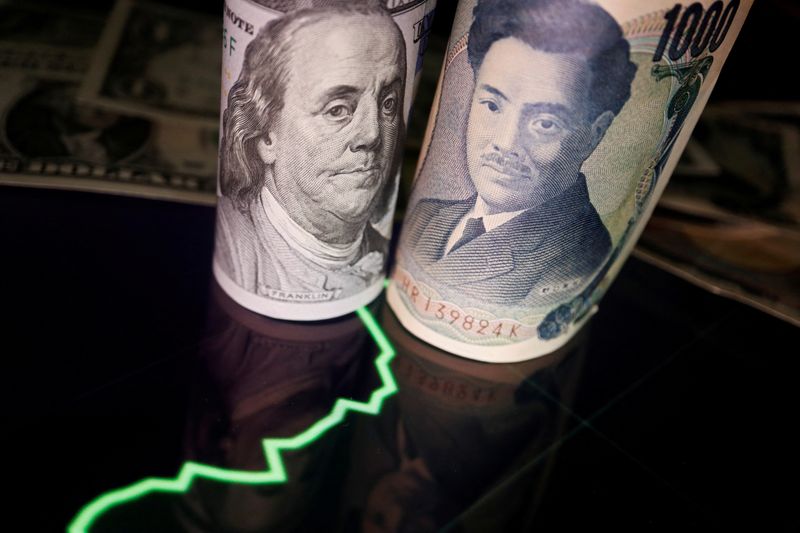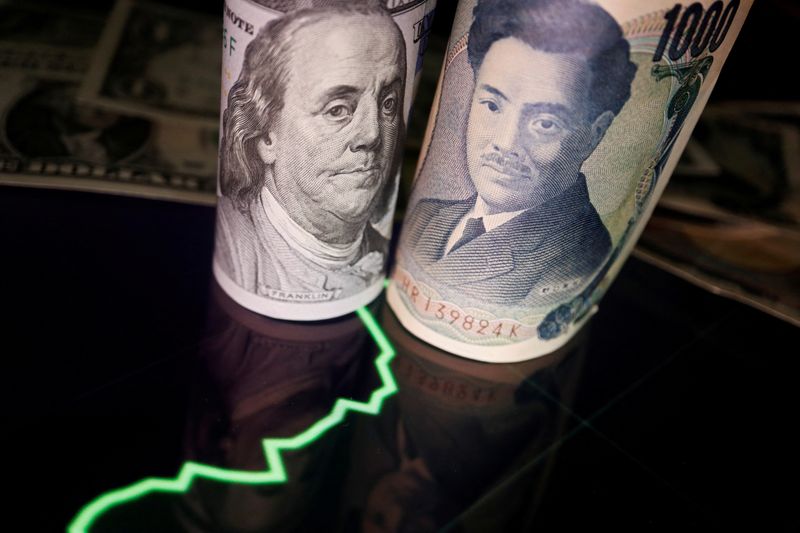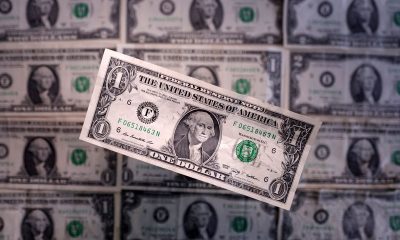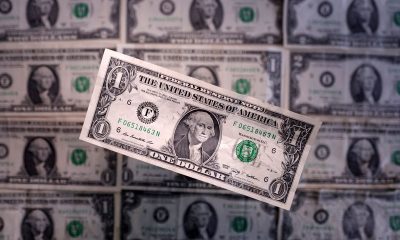Economy
Yen jumps on BOJ’s comments; dollar dips as US inflation eyed


© Reuters. FILE PHOTO: Japanese yen and U.S. dollar banknotes are seen with a currency exchange rate graph in this illustration picture taken June 16, 2022. REUTERS/Florence Lo/Illustration/File Photo
By Chuck Mikolajczak
NEW YORK (Reuters) – The yen strengthened sharply against the dollar on Monday in the wake of comments from Bank of Japan (BOJ) Governor Kazuo Ueda that fueled expectations the central bank could shift away from its negative interest rate policy, while the greenback eased ahead of U.S. inflation data due later in the week.
The dollar was last 1.01% weaker at 146.31 against the Japanese currency after earlier dropping about 1.3% to 145.89, its lowest since Sept. 1 after comments over the weekend from Ueda that the BOJ could end its negative interest rate policy if it is determined the inflation target can be achieved.
The dollar softened ahead of U.S. inflation data due on Wednesday, with the Federal Reserve widely expected to pause its interest rate hikes at its policy meeting next week, but additional hikes still on the table for this year should data indicate the economy and inflation are not cooling fast enough.
“It seems that while signaling that they could be closer to abandoning negative rates at year end if a major shift, we still have a long way to get there,” said Edward Moya, senior market analyst at Oanda in New York of Ueda’s comments.
“In following some of the past BOJ interventions, they don’t want to waste their ammunition when the other side of the trade, driven by the US economy, could be upended. That is why they had to go jawboning, they had to go verbal intervention again.”
Expectations the Fed will hold rates steady next week stand at 93%, according to CME’s FedWatch Tool, with about 39% chance of a 25 basis point hike for the November meeting.
Aside from data on consumer prices due Wednesday, investors will also see producer prices and retail sales numbers on Thursday.
The yen has come under pressure against the dollar as the BOJ remains a dovish outlier among global central banks, especially since the Federal Reserve began its aggressive rate-hike cycle last year.
Traders have been closely watching for any signs of intervention from Japan to shore up the yen since it weakened past the 145 per dollar threshold last month. A year ago, that level resulted in the first yen-buying intervention by the authorities since 1998.
The , which measures the U.S. currency against peers including the yen, was last down 0.32% to 104.51, after falling to 104.41, its lowest since Sept. 5. The dollar has climbed for eight straight weeks.
Against the softer dollar, sterling gained 0.5% to $1.2527, continuing to recover from a three-month low of $1.2445 hit last week. The euro gained 0.43% to $1.0745.
Economy
Russian central bank says it needs months to make sure CPI falling before rate cuts -RBC


© Reuters. Russian Central Bank Governor Elvira Nabiullina attends a news conference in Moscow, Russia June 14, 2019. REUTERS/Shamil Zhumatov/File Photo
MOSCOW (Reuters) – Russia’s central bank will need two to three months to make sure that inflation is steadily declining before taking any decision on interest rate cuts, the bank’s governor Elvira Nabiullina told RBC media on Sunday.
The central bank raised its key interest rate by 100 basis points to 16% earlier in December, hiking for the fifth consecutive meeting in response to stubborn inflation, and suggested that its tightening cycle was nearly over.
Nabiullina said it was not yet clear when exactly the regulator would start cutting rates, however.
“We really need to make sure that inflation is steadily decreasing, that these are not one-off factors that can affect the rate of price growth in a particular month,” she said.
Nabiullina said the bank was taking into account a wide range of indicators but primarily those that “characterize the stability of inflation”.
“This will take two or three months or more – it depends on how much the wide range of indicators that characterize sustainable inflation declines,” she said.
The bank will next convene to set its benchmark rate on Feb. 16.
The governor also said the bank should have started monetary policy tightening earlier than in July, when it embarked on the rate-hiking cycle.
Economy
China identifies second set of projects in $140 billion spending plan


© Reuters. FILE PHOTO: Workers walk past an under-construction area with completed office towers in the background, in Shenzhen’s Qianhai new district, Guangdong province, China August 25, 2023. REUTERS/David Kirton/File Photo
SHANGHAI (Reuters) – China’s top planning body said on Saturday it had identified a second batch of public investment projects, including flood control and disaster relief programmes, under a bond issuance and investment plan announced in October to boost the economy.
With the latest tranche, China has now earmarked more than 800 billion yuan of its 1 trillion yuan ($140 billion) in additional government bond issuance in the fourth quarter, as it focuses on fiscal steps to shore up the flagging economy.
The National Development and Reform Commission (NDRC) said in a statement on Saturday it had identified 9,600 projects with planned investment of more than 560 billion yuan.
China’s economy, the world’s second largest, is struggling to regain its footing post-COVID-19 as policymakers grapple with tepid consumer demand, weak exports, falling foreign investment and a deepening real estate crisis.
The 1 trillion yuan in additional bond issuance will widen China’s 2023 budget deficit ratio to around 3.8 percent from 3 percent, the state-run Xinhua news agency has said.
“Construction of the projects will improve China’s flood control system, emergency response mechanism and disaster relief capabilities, and better protect people’s lives and property, so it is very significant,” the NDRC said.
The agency said it will coordinate with other government bodies to make sure that funds are allocated speedily for investment and that high standards of quality are maintained in project construction.
($1 = 7.1315 renminbi)
Economy
Russian central bank says it needs months to make sure CPI falling before rate cuts -RBC


© Reuters. Russian Central Bank Governor Elvira Nabiullina attends a news conference in Moscow, Russia June 14, 2019. REUTERS/Shamil Zhumatov/File Photo
MOSCOW (Reuters) – Russia’s central bank will need two to three months to make sure that inflation is steadily declining before taking any decision on interest rate cuts, the bank’s governor Elvira Nabiullina told RBC media on Sunday.
The central bank raised its key interest rate by 100 basis points to 16% earlier in December, hiking for the fifth consecutive meeting in response to stubborn inflation, and suggested that its tightening cycle was nearly over.
Nabiullina said it was not yet clear when exactly the regulator would start cutting rates, however.
“We really need to make sure that inflation is steadily decreasing, that these are not one-off factors that can affect the rate of price growth in a particular month,” she said.
Nabiullina said the bank was taking into account a wide range of indicators but primarily those that “characterize the stability of inflation”.
“This will take two or three months or more – it depends on how much the wide range of indicators that characterize sustainable inflation declines,” she said.
The bank will next convene to set its benchmark rate on Feb. 16.
The governor also said the bank should have started monetary policy tightening earlier than in July, when it embarked on the rate-hiking cycle.

 Forex3 years ago
Forex3 years agoForex Today: the dollar is gaining strength amid gloomy sentiment at the start of the Fed’s week

 Forex3 years ago
Forex3 years agoUnbiased review of Pocket Option broker

 Forex3 years ago
Forex3 years agoDollar to pound sterling exchange rate today: Pound plummeted to its lowest since 1985

 Forex3 years ago
Forex3 years agoHow is the Australian dollar doing today?

 Cryptocurrency3 years ago
Cryptocurrency3 years agoWhat happened in the crypto market – current events today

 World3 years ago
World3 years agoWhy are modern video games an art form?

 Commodities3 years ago
Commodities3 years agoCopper continues to fall in price on expectations of lower demand in China

 Economy3 years ago
Economy3 years agoCrude oil tankers double in price due to EU anti-Russian sanctions

























